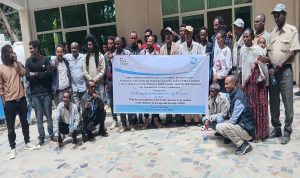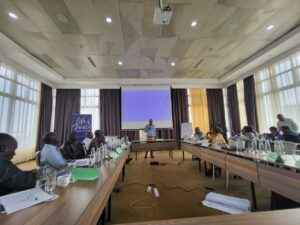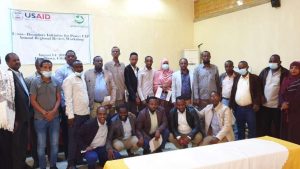
The Ethiopian Institute of Peace (EIP) is currently implementing a project titled “Addressing Peace Building and Access to Basic Services for the Populations affected by the Humanitarian Crisis in the Northern Ethiopia.
Activity Start Date and End Date: September 15,2024- September 14,2025.
Funding organization: Centre de crise et de soutien of the Ministry of Europe and Foreign Affairs
Implemented by: The Ethiopian Institute of Peace (EIP).
Implementing partners: Solidarites International (SI) -Lead Agency and Medicines Do Monde France (MdM).
Target areas: Adwa Town Woreda of Central Zone Tigray, Samre Woreda in Southeast Tigray Zone and Abala Woreda in Zone 2 of the Afar Regional State.
Project Objective: The project’s overall objective is to improve the well-being of former combatants to reintegrate into civilian life through a set of trainings, provision of MHPSS services and supports in income generating activities.
Project outcome: Former combatants and local population are supported in creating a social environment favorable to the reintegration of former combatants into the civil society.
Key stakeholders: Peace and Security, Patriots Commission, Diversity and Peoples’ Relations Office, Social Affairs and Rehabilitation Bureau at regional and lower levels as well as target communities in the project areas.
Target Beneficiaries: Former combatants of Afar and Tigray regions, informal authorities (elders and customary institutions including women).
Main Activities of the Project
-
- Provision of training on the Culture of Peace, Trauma-Informed Recovery and Resilience, and Life Skills for former combatants
- Organization of discussion groups focused on the reintegration of former combatants, involving the local community and indigenous/formal authorities
- Dissemination of communication channels through a mass media campaign focused on the reintegration of former combatants
 Training of former combatants: EIP has targeted to train 750 former combatants in Culture of Peace, Trauma Recovery and Resilience (TIRR), and Life Skills. As a result, a total of 701 (93.5%) former combatants took the trainings in 23 sessions until the end of July 2025. The trainees were drawn from the project woredas namely – Adwa 406 (94,4%), Samre 195 (88,6%), and Abala 100 (100%). Training participants were identified according to a set of selection criteria developed in consultation with government stakeholders.
Training of former combatants: EIP has targeted to train 750 former combatants in Culture of Peace, Trauma Recovery and Resilience (TIRR), and Life Skills. As a result, a total of 701 (93.5%) former combatants took the trainings in 23 sessions until the end of July 2025. The trainees were drawn from the project woredas namely – Adwa 406 (94,4%), Samre 195 (88,6%), and Abala 100 (100%). Training participants were identified according to a set of selection criteria developed in consultation with government stakeholders. Conducting group discussions: The group discussions comprise community representatives and selected former combatants who already been trained in Culture of Peace, TIRR and Life Skill. Hence, a total of 16 group discussions have been conducted in the project woredas so far. The group discussions bring together trained former combatants and informal authorities to discuss issues on how to reintegrate formal combatants and into the society including challenges. So far, a total of 586 people participated in the discussions (354 in Adwa, 143 in Samre and 89 in Abala).
Conducting group discussions: The group discussions comprise community representatives and selected former combatants who already been trained in Culture of Peace, TIRR and Life Skill. Hence, a total of 16 group discussions have been conducted in the project woredas so far. The group discussions bring together trained former combatants and informal authorities to discuss issues on how to reintegrate formal combatants and into the society including challenges. So far, a total of 586 people participated in the discussions (354 in Adwa, 143 in Samre and 89 in Abala).
Training of journalists: EIP conducted a 3-day training of 30 journalists in Trauma and Conflict Sensitive Reporting. The purpose of the training is to create awareness on reintegrating former combatants and promote harmonious relationships between war-affected communities in conflict and trauma sensitive manner. Accordingly, 25 people (83%) participated in the training, of which 4 (13%) and 20 (67%) were female and male respectively. The trainees were drawn from public and private media institutions operating in the target woredas. Among others, the major contents of the training include:
- Trauma, Communications and the Media,
- Harms/Risks of communication in trauma context (Re-Traumatization of Survivors, Exploitation or Sensationalism, Loss of Privacy and Safety, Cultural Misunderstandings, One-Sided Narratives, Emotional Toll on Communicators,
- Positive roles of the media when done ethically (in
promoting justice, accountability, in fostering, dialogue and peacebuilding, preserving historical memory, documenting traumatic events, breaking silence and stigma, mobilizing aid and resources, amplifying survivor voices, providing a platform for survivors to share their experiences, reclaim their narratives, and speak truth to power and raising awareness), - The negative roles of the media Loss of privacy and safety, exploitation or “trauma porn, sensationalism and dis/Misinformation, one-sided or biased narratives, cultural insensitivity (misunderstanding local values or customs in storytelling) and emotional harm to Journalists.
- Trauma-Informed Reporting
- Guiding Principles of Trauma Informed Reporting (‘Do No Harm’, avoidance of re-traumatization, informed consent, respect privacy and confidentiality, accuracy without sensationalism, empowering the survivor, contextualizing trauma)
- Trauma Informed Interview Techniques
- Ethical considerations: Dos & Don’ts of Trauma Reporting



